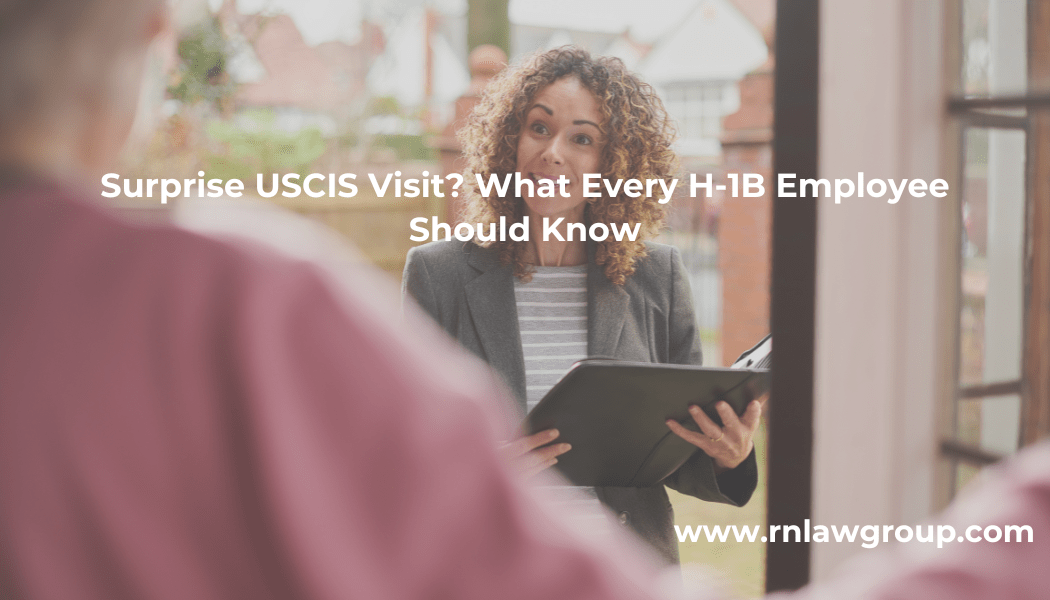
Surprise USCIS Visit? What Every H-1B Employee Should Know
As an H-1B employee, you may be aware that the U.S. Citizenship and Immigration Services (USCIS), through its Fraud Detection and National Security (FDNS) Directorate, conducts worksite visits to verify information submitted in immigration petitions. These FDNS visits are meant to ensure that the H-1B program is being used properly and that employees are working in accordance with the terms of their petition, including your job title, duties, work location, and salary.
Before December 2024, participation in FDNS site visits was technically voluntary. However, cooperation is now required. Refusing to answer questions or denying access to information could raise compliance concerns. Employees working at their employer’s office often have the benefit of a manager or HR representative nearby who can assist during an FDNS visit. In contrast, employees working remotely, especially if unexpectedly visited at home, often face the situation alone without immediate support. That said, you still have rights and should feel empowered to verify the officer’s identity and involve your employer or immigration attorney as needed.
If someone claiming to be a USCIS officer contacts you by phone, email, or in person, it’s important to know what to expect and how to respond. Here is a step-by-step guide to help you handle the situation with confidence and protect your rights.
1. Preparation Is the Best Defense
The best way to handle an FDNS site visit is to be prepared before it happens. While you can’t predict when or if you’ll be contacted, having the right documents and a clear understanding of your employment terms can make the process much smoother.
Request a copy of your Labor Condition Application (LCA) from your employer if you do not have a copy already, and keep it for your records. It’s also a good idea to keep easily accessible copies of key documents related to your employment, such as your offer letter, employment agreement, employee handbook, recent pay statements, and your H-1B approval notice. Being familiar with the terms of your employment, including your job title, duties, work location, salary, and who supervises your work, can help you answer questions confidently and accurately.
Taking these simple steps ahead of time can help ensure you’re ready if a site visit ever occurs, whether you’re in the office or working remotely.
- Don’t Panic! Stay Calm and Professional
An FDNS visit does not necessarily mean you or your employer did something wrong. These site visits are often random or part of a broader compliance initiative. Keep calm, remain polite, and remember that the goal is simply to verify information.
3. Verify the Officer’s Identity
Before answering any questions or allowing someone access to your workplace:
In person: Ask to see official identification. A real USCIS officer should present a federal ID badge with their name, title, and agency clearly visible.
By phone or email: If someone contacts you to schedule a visit or interview, do not share personal information right away. Politely ask for their full name, title, agency, and a callback number or official email address. A legitimate USCIS email address should end in “.gov.” If it does not, consider that a red flag. As soon as you are able, forward this information to your HR department or immigration attorney for confirmation.
Always take notes: Whether the contact is in person or remote, write down the officer’s name, agency, and contact information. If available, ask for a business card.
If anything feels off: If the visit or message seems suspicious, or if the person refuses to provide ID or contact details, do not engage further in that moment. If possible, ask to schedule the conversation for later, and contact your HR representative or immigration attorney for guidance before proceeding.
Verifying identity is a critical step in protecting your information and ensuring the interaction is legitimate. USCIS officers are generally aware of scams and should accommodate reasonable requests to verify their identity.
4. Understand the Scope of Their Questions
FDNS officers typically ask about:
- Your educational background and immigration status
- Your job title and duties
- Your work location (including remote/hybrid arrangements)
- Your work schedule and salary
- Who paid the fees for your petitions with USCIS
- Your relationship to your employer, including performance reviews and how you are supervised or managed
They may also ask to see your identification, copies of your H-1B approval notice, pay stubs and additional documents related to your work.
5. Answer Only What Is Asked, Don’t Guess or Speculate
Only provide answers to the best of your knowledge. While it’s important to cooperate with the officer, try to answer questions clearly and directly, without offering more information than is required. It’s perfectly fine to pause and take a moment to think before responding or ask for clarification if you are not sure what information the officer needs. Giving too much detail can sometimes lead to misunderstanding, and providing incorrect or speculative information can create unnecessary concern. If you’re unsure about something, it’s okay to say, “I’m not sure, I’d like to check with my employer.”
If you can’t answer everything right away, it’s fairly common for FDNS officers to follow up later for more details or documentation via email. Waiting to provide information after you’ve had time to confirm the facts helps avoid accidentally giving incorrect answers that could cause problems down the line. If your answers don’t match the information in your petition, at some point in the future your employer might receive a Notice of Intent to Revoke your H-1B approval. As long as you and your employer are following the rules and abiding by the terms of your employment, these issues can usually be resolved.
6. Report the Visit to Your Employer and Attorney
After the contact or visit, let your employer know immediately. If your company has immigration counsel, provide all the details you can recall, including:
- Date and time of the visit
- The officer’s name and agency
- What questions were asked
- Any documents requested or reviewed
Your employer may be contacted separately, or this may be the only visit.
7. Watch Out for Scams
Unfortunately, there are scammers who pose as government officers to target immigrants. USCIS will never:
- Ask for payment or personal banking information
- Demand information via unofficial channels like WhatsApp, text or personal email
If you suspect a scam, you can report it to the Federal Trade Commission (FTC) or your state’s consumer protection office.
In Summary
FDNS visits are a standard part of the H-1B compliance process, and most are routine. By staying calm, verifying the officer’s identity, and consulting your employer or attorney as needed, you can navigate the process with confidence and protect your rights.
By : Adena Bowman
Adena Bowman is a Senior Associate Attorney at Reddy Neumann Brown PC with over 12 years of experience in U.S. immigration law. She helps clients ranging from small businesses to large multinational corporations bring workers to the U.S. and stay compliant with immigration regulations. She also guides individual clients through employment, investment, and family-based immigration matters. Clients rely on her for clear guidance, strategic planning, and personalized support in navigating complex immigration challenges.

